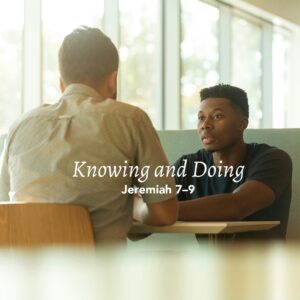Jeremiah 7-9: Knowing and Doing
October 4, 2024
TODAY'S BIBLE READING:
Jeremiah 7-9, Ecclesiastes 3:1-15, John 1:35-42, James 2:1-13

Jeremiah is told to make a public pronouncement—to stand “in the gate of the LORD’s house” (7:2). He is publishing a press release in the religious media; he is hammering his 95 theses to the door of Wittenberg. What is it that he must so publicly announce?
Throughout these two chapters, two points are being made, here introduced at the start:
1) If they repent, in practice and in deed and not merely in theory, then God will relent from his punishment: “Amend your ways and your deeds, and I will let you dwell in this place” (7:3).
2) They are to beware of taking their confidence from a mere formal allegiance to the things of God, the notional reliance on the ceremony and ritual of Old Testament piety: “Do not trust in these deceptive words: ‘This is the temple of the Lord, the temple of the Lord, the temple of the Lord’” (7:4).
The second point is not immediately obvious to us. We are unlikely to want to say “The temple of the LORD,” and use that as an excuse to avoiding doing what God has asked us to do. But in our faith structure today, we can similarly repeat slogans to prevent us from hearing God’s conviction of our sin. For some today, it is the Bible that we use more as a slogan than as an actual Word from God that we must follow. We say not “the temple of the LORD, the temple of the LORD,” but we do say “the Bible, the Bible”—and with a different excuse we can similarly avoid doing justice and seeking mercy, protecting the unborn and fighting the human trafficking plague in our world today. We must “truly execute justice one with another” (7:5).
By contrast, the prophets of Jeremiah’s day had spoken words of light comfort, when they were meant to have challenged and confronted God’s people:
“They have healed the wound of my people lightly, saying, ‘Peace, peace,’ when there is no peace.” (Jeremiah 8:11)
Today, too, it is easy to find preachers who will tell us what we want to hear. They will tell us that sexual immorality has no consequence. They will tell us that God’s desire is for us to be wealthy and hoard prosperity rather than use our resources with generosity. They will not preach hell and judgment.
Today, too, people gather around the teachers who will tell them what their itching ears wish to hear. The result of this is cataclysmic:
“Oh that my head were waters, and my eyes a fountain of tears, that I might weep day and night for the slain of the daughter of my people!” (Jeremiah 9:1)
And reminds us that, like George Whitefield, if we preach hell and judgment, we can only do so with tears in our eyes—“eyes a fountain of tears.”
So then what should we be like? God, through his prophet, tells us: to know God and to follow God with love, justice and righteousness (9:24).
“Let not the wise man boast in his wisdom, let not the mighty man boast in his might, let not the rich man boast in his riches, but let him who boasts boast in this, that he understands and knows me, that I am the Lord who practices steadfast love, justice, and righteousness in the earth. For in these things I delight, declares the Lord” (Jeremiah 9:23-24)
Knowing God means doing what God what wants done.
ABOUT THE AUTHOR
Josh Moody (Ph.D., University of Cambridge) is the senior pastor of College Church in Wheaton, IL., president and founder of God Centered Life Ministries, and author of several books including How the Bible Can Change Your Life and John 1-12 For You.
WANT MORE?
To receive God Centered Life devotionals directly in your inbox, as well as other resources, enter your email address in the form at the bottom of this page and click "subscribe."

